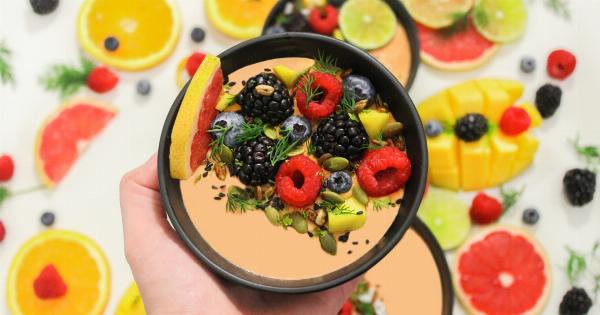Smoothies are often seen as a healthy option for a quick and convenient meal or snack. Packed with fruits, vegetables, and other nutritious ingredients, they can provide a burst of vitamins and minerals.
However, if not prepared with care, smoothies can also be a hidden source of excess calories and sugar, leading to weight gain rather than weight loss. In this article, we will explore the top reasons why your smoothies might be making you fat.
1. Excessive Fruit Consumption
Fruits are an essential part of smoothies, as they provide natural sweetness and a variety of beneficial nutrients. However, fruits also contain natural sugars, and consuming them in excess can lead to an overload of calories.
To avoid this, it is important to be mindful of portion sizes and balance the fruit content with low-sugar options like leafy greens or adding healthy fats like avocado or nut butter.
2. Lack of Protein and Fiber
Protein and fiber are essential macronutrients that help keep you feeling full and satisfied. Without adequate protein and fiber in your smoothie, you may find yourself feeling hungry sooner, leading to overeating.
Consider adding ingredients like Greek yogurt, silken tofu, chia seeds, or oats to enhance the protein and fiber content of your smoothie.
3. High-Calorie Add-Ins
Smoothies can be easily enhanced with various add-ins, such as sweeteners, flavored syrups, or high-calorie nut butters. While these add-ons may enhance the taste, they also contribute extra calories without providing significant nutritional value.
Opt for natural sweeteners like honey or maple syrup in moderation, and choose unsweetened versions of nut butters or nut milk to reduce added sugars and calories.
4. Ignoring Liquid Calories
The liquid base of your smoothie can also be a hidden source of calories. Using high-calorie liquids like fruit juices, flavored yogurt, or sweetened almond milk can significantly increase the calorie content of your smoothie.
Instead, opt for unsweetened almond milk, coconut water, or plain water to keep the calorie count in check.
5. Not Minding Portion Sizes
Even though smoothies are often associated with health, portion control still matters. Drinking oversized smoothies can easily lead to consuming excess calories. Keeping an eye on the portion size can help you stay within your calorie goals.
Consider using smaller glasses and bowls to control portion sizes, and remember that smoothies should be treated as a meal or snack rather than a bottomless beverage.
6. Forgetting about Healthy Fats
While it may be tempting to go completely fat-free in an attempt to cut calories, healthy fats are actually important for overall health and satiety.
Including sources of healthy fats, such as nut butters, chia seeds, or coconut oil, can help slow down digestion and keep you feeling full for longer.
7. Lack of Variety
Repetitive smoothie choices may limit the range of nutrients you receive. Different fruits and vegetables offer different vitamins, minerals, and antioxidants.
By sticking to the same smoothie recipe every day, you may miss out on obtaining a well-rounded nutrient profile. Experiment with a wide array of fruits, vegetables, and other smoothie ingredients to maintain a varied and nutritious diet.
8. Not Considering Overall Caloric Intake
When incorporating smoothies into a weight loss or weight management plan, it is crucial to consider the overall caloric intake for the day.
While smoothies can be a healthy option, consuming them in addition to a regular diet without adjusting portion sizes can lead to an excess of calories. Keep track of your total daily intake and ensure your smoothie fits within your overall calorie goals.
9. Mindless Snacking alongside Smoothies
Although smoothies can be a filling option, pairing them with mindless snacking can quickly derail your weight loss efforts.
Even if your smoothie is nutritious, mindlessly munching on unhealthy snacks alongside it can contribute to excess calorie intake. Be mindful of your overall snacking habits and try to choose nutrient-dense options like raw nuts or sliced veggies when hunger strikes.
10. Relying Solely on Smoothies for Nutrition
While smoothies can serve as a convenient meal or snack, relying solely on them for all your nutrition can be detrimental.
Whole foods contain a variety of nutrients that are not present in smoothies alone, such as fiber from whole grains or antioxidants from dark leafy greens. Incorporate a variety of whole foods into your diet to ensure you are obtaining a well-balanced nutritional profile.




























